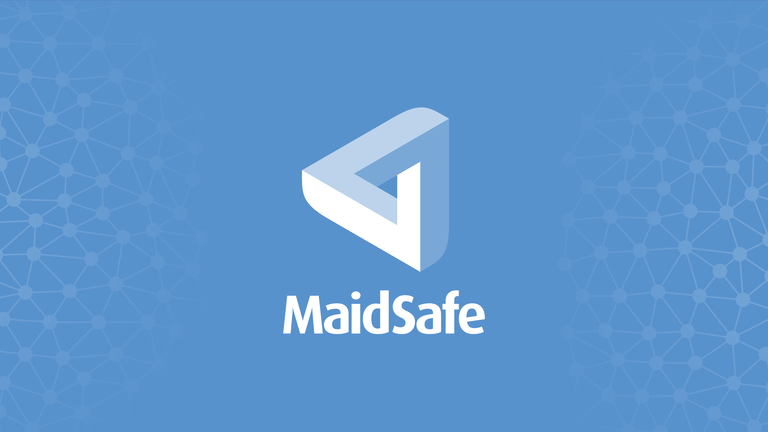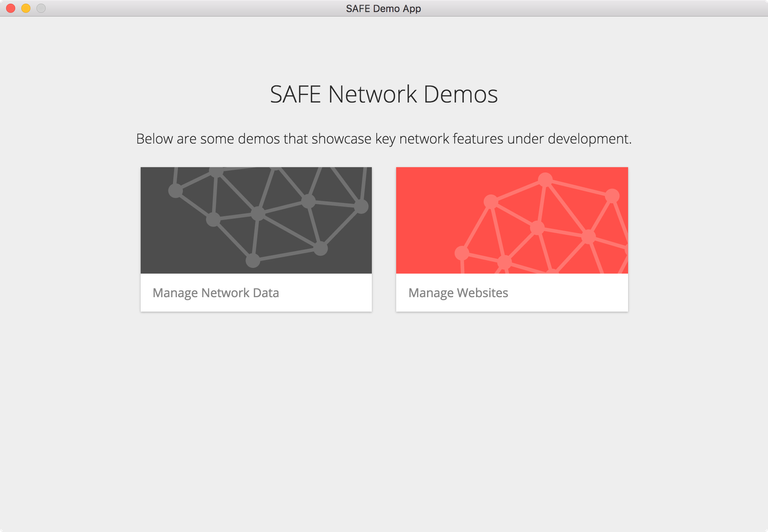When we started looking into MaidSafe, we expected to find yet another decentralized, end-to-end encrypted cloud storage service. But then we caught glimpses of the next Internet.
Founded in the dark era before Satoshi Nakamoto kicked off the cryptocurrency revolution, 10 years in the making, MaidSafe aims to offer a fully decentralized, end-to-end encrypted, private and secure alternative to today's Internet. The SAFE network aims to one day replace today's CLEARNET, nothing less.
MaidSafe has recently released a convincing alpha version that showcases the storage and retrieval of static web pages. While there is obvious progress, not all parts of the network are finished yet, and those that are finished, are not yet connected together. The current alpha release, for example, stores its data in a controlled set of centralized storage nodes, while the tests for the storage part of the network are running separately, accessible only to select developers (Update: storage aka. "The Vault" can now easily be tested thanks to Testnet 8. We started this review a few days before Testnet 8 was released). The network also still lacks the implementation of a cryptocurrency to pay for access and to reward services rendered by individual participants.
Development seems to have reached a critical point though and we expect to see a lot of progress in the coming months. Will the next Internet revolution start in Troon, Scotland?

The Technology
The SAFE network, like Storj, builds on a Kademlia-based distributed hash table to establish and maintain network consensus on stored data and communications. Relying on four different authorities, the network's consensus mechanism is quite complex. It aims to optimize privacy, reliability, speed and network resilience by localizing certain decisions (e.g. the right to read data) and globalizing others (e.g. the right to write data or to create a name).
Data is cut up into chunks, encrypted locally and distributed across the network. The network keeps redundant copies of each data item, always maintaining enough copies to prevent data loss and increasing redundancy (and thus speed) for data that is in strong demand. To further increase privacy, the SAFE network implements multi-hop routing.
Providing storage AND communications, the SAFE network offers nothing less than a peer to peer distributed alternative to the Internet. Making use of these properties for static data (e.g. to publish a static website) is trivial, given the current toolset: download the launcher and the demo app, create a name, upload some data and you're public on the SAFE network.
Unfortunately, the lack of an API for dynamic data or calculations makes creating an interactive service on the SAFE network mind-bendingly difficult. Building such a service involves the creation of an additional "service" protocol on top the existing protocol. If you want do dig deeper into this, we recommend studying the progress of Project Decorum.
An alternative to the native approach of solving the dynamic data problem would be to introduce a centralized instance, a regular server, for the management of the dynamic aspects of a service. With this approach, we would be forcing an architecture similar to TOR, partially defying the purpose of the network's architecture. It is not entirely unlikely that such hybrid approaches, even the creation of TOR-style exit nodes could become necessary in the early stages of network establishment.
We feel that right now, Ethereum-style smart contracts offer a more accessible way to create interactive applications on a distributed network and are eager to see what solutions MaidSafe will come up with in the long run.
The Economy
MaidSafe has been around long before Satoshi Nakamoto unleashed Bitcoin into the public domain. The project only entered the Altcoin space in 2014, through a wildly successful crowdfunding debacle.
454M MAID tokens were created for the crowdfunding event, 430M of which were sold to the public for, at the time, US$ 8M. 24M remained in the hands of the MaidSafe Foundation. US$ 8M were raised in the form of Bitcoin and Mastercoin. Due to the crash of the Mastercoin price after the crowd sale and a fall in Bitcoin price, MaidSafe was only able to finance running costs of US$ 2M out of the crowdfunding proceeds. In May 2016, the MaidSafe Foundation decided to advance the remaining 24M tokens to MaidSafe in order to finance the continued development of the network.
To date, no cryptocurrency has been implemented on the SAFE network. Eventually, MaidSafe will deploy the Safecoin on the network to allow for the payment of storage and bandwidth resources. MAID holders will be able to exchange their tokens for Safecoins once the Safecoin is implemented, on a 1:1 basis.
Eventually, demand for Safecoins will be driven by the demand for services offered by the SAFE network and potentially other services layered on top of that network.
With less than 5% of all tokens remaining in the hands of MaidSafe, questions about transparency are less pressing than with other projects. However, given the project's substantial market capitalization of 50M US$, we'd certainly wish to know a bit more about the future of the Safecoin, the project owner's holdings and the use of the 24M coins still in the project's possession.
Developers and Community
Building the next Internet takes time. While MaidSafe can look back on 10 years of history, development of the current version really picked up in 2014/2015, after the crowdfunding event. MaidSafe's current team is about 15 people strong, and is hiring. Although based in Troon, Scotland, MaidSafe has drawn talents from many different cultures and countries, reflecting the users that the network serves.

With its potent mission, MaidSafe has been able to attract a strong community and there are reward programs in place for specific pieces of work on the core, as well as for immediate and fundamental SAFE network requirements like the implementation of a SAFE browser.
MaidSafe aims to strike a balance between central steering of the project and decision making based on community input. The team frequently posts on this subject on the blog and in the SAFENET forum and seems to have built very strong ties with the community.
End User Experience
On August 12th, MaidSafe published their first Alpha Release, consisting of the SAFE Launcher and the SAFE Demo App.

The Launcher builds a bridge into the network and acts as a proxy towards the user's browser. It also authenticates Apps like the Demo App for the use of the network.

The Demo App enables the user to store private data on the network, to register an identity and to publish one or more static web pages. In our tests, setup was a breeze and the SAFE network performed flawlessly. In order to allow regular browsers to access the SAFE network, a proxy needs to be set up. This process is a bit technical in nature, but with the help of an easy HowTo, we don't see it as a big hindrance even for less experienced users. An ongoing community project aims to implement a SAFE browser, eliminating the need to configure a proxy. We are uncertain whether the elimination of this slight nuisance really warrants the effort of a custom browser implementation and all the obvious problems that come with such a project.
Conclusion
MaidSafe has ambitious goals and is working towards them with a very European attitude of "haste makes waste". An odd project in a technological space that is otherwise moving at breakneck speed.
The SAFE network is facing a number of big obstacles before it can fully deliver on its promise to give online communication back into the hands of the people:
- You don't need a tinfoil hat to recognize that authorities are attacking this kind of technologies on all legal and illegal levels.
- The pain is felt by many, but adoption of privacy protecting technologies by the public has historically been very weak.
- Technologically, the barrier of entry to create interactive applications on the SAFE network is still very high and there is a danger that this technology will loose the race to others that offer better solutions for interactivity, or to projects like TOR that compromise on decentralization, encrypting/obfuscating the existing communication layer of the Internet.
- All questions regarding effort/reward for participation that we raised in our reviews of the cloud storage services Storj and Sia equally apply to MaidSafe.
Grand plans lead to spectacular successes or equally impactful failures. Looking into the MaidSafe project, we saw glimpses of a better Internet, of a communication technology that would allow people to take back control over their identity and act on their human right to speak freely without having to fear prosecution by the authorities. The CLEARNET (as SAFE netters call the regular internet) has shifted control far too much into the direction of central power and is progressively depriving us of the most fundamental right to a private life. It will take time for the general public to accept this reality and to act on it, but we are confident that many years from now, the current level of state surveillance and the idea of a CLEARNET will look as ridiculous as the concept of a Sun King. Or, as @Grizmoblust put it on the SAFE network forum: "Clearnet needs to die. Period."

A good place to work on the future of the Internet. Image by John Johnston (CC commercial license)
| Name | Explanation |
|---|---|
| Project URL | https://maidsafe.net |
| Company | maidsafe.net Limited, MaidSafe Foundation |
| Direct/indirect competitors | Sia, Storj |
| Market cap | 45'039'781 US$ |
| Announced (bitcointalk.org) | April 22nd, 2014, network in development since 2006 |
| Network launch | alpha release: August 12th, 2016 |
| Next milestone | beta release, date undisclosed |
| Blockchain type | no blockchain except for MAID coin: Mastercoin based Bitcoin proxy token |
| Stored on the blockchain | no blockchain used |
| Other distributed technologies | Kademlia DHT, used for storage and communication |
| Coins available | 452'552'412 MAID |
| Coins total | 452'552'412 MAID |
| Listed at | Poloniex, Livecoin, Bittrex, Yuanbao, BloomBit, Chameleon Bit |
Very exciting, thanks for the in depth review. As always look forward for more posts from you.
Thank you :)
Good write up
Feedback on the article (and in general a lot of additional information/discussions about MaidSafe) can be found in the SAFE network forum: https://safenetforum.org/t/maidsafe-review-the-next-internet-will-be-ours
@iainc Thanks for the informative post about Maidsafe for an intesting read :-https://steemit.com/cryptocurrency/@pps/maidsafe-cryptocurrency-a-brand-new-internet